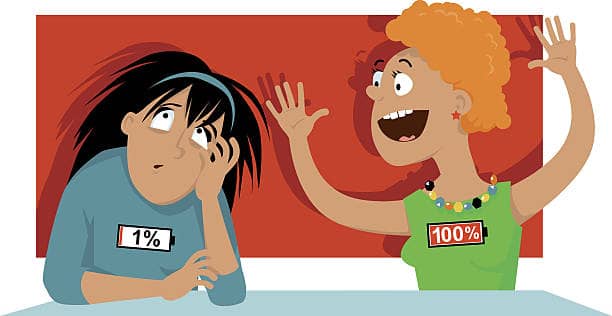Humans are different. We all have our individual social preferences. Some are the life of the party, and some would much rather have a book or a movie in the safety and warmth of their own home. Some people would enjoy a close circle of friends, and some are everybody’s best friends.
What are the factors that control our social choices? Why is it that when someone is not feeling well, it’s not always wise to offer them your company? The introvert vs. extrovert distinction is not exactly a new concept, though perhaps a new term.
For ages, people have had different mindsets and have made them clear through various social situations. Recently, the world has grown smaller, and people have become a lot more expressive. The need to identify with a term that summarizes your attitude towards a social life has emerged.
Now, the world is more accepting of personal differences. And as long as you can find an already set category to fit in, the Internet guarantees you that you won’t be the only one.
In this article, we will explain how introvert vs. extrovert approach the numerous angles of life. We will also help you find out on which side of the spectrum you probably stand.

Table of Contents
Which Comes First?
It is vital to understand how terminology works. First, terms arise to give something already existent a name. That means that before “introvert” and “extrovert” became common words, the characteristics and personality traits they describe were long present.
And that also means that the terminology doesn’t set the rules or draw the lines; it merely labels a vast collection of features to facilitate reference.
So instead of laying down a long list of adjectives to describe a person, you can quickly call them, for example, apprehensive, emotionally stable, dominant, introvert, or extrovert.
Language certainly makes communication more accessible, but beware of the trap we all end up falling into. Don’t limit people to a term or a concept. People are far more complicated and diverse than terminology can handle.
Never follow a set of rules a linguistic time identifies; learn about yourself and what you are first, then identify with the term, never the opposite. Apply the same direction when dealing with others. Recognize that the brush of humanity doesn’t always color inside the lines. Keep that in mind when interacting with friends or acquaintances.
Introvert vs. Extrovert
Their opposites recognize most things out there. We cannot call something “hot” if we have never felt something cold before. The introvert vs. extrovert concept is pretty much the same.
Imagine a long ruler with extreme introversion on the far right end and extreme extraversion on the far left end. Humans are randomly scattered on the ruler: some are on the sides, and some lie in between.
That means that you can be 70% an introvert and 30% an extrovert, but not 65% an introvert and 80% an extrovert. The two adjectives are two sides of one spectrum. Let us now accurately define them.
What Is an Introvert?
Introversion is a tendency to favor your own company over that of others. An introvert is predominately (or wholly) satisfied with being alone. Many activities require solitary.
Those of us who’d often instead engage in these activities than hanging out with others in the open are introverts. Introversion is a constant behavior. So you don’t just “become” an introvert if you’re down or a little depressed.
Unlike the common assumption, introversion is not a negative thing. The linguistic connotation might imply otherwise, but it is not valid. Introverts are happier on their own. They don’t resent a social life; they appreciate friends like everybody else, but they don’t “need” to be with others to feel good.
Introverts are not party animals and don’t exactly have tons of friends. Introverts often enjoy a few close friends that they can trust and enjoy spending time with. Many occupations are highly introverted: for example, writers, artists, engineers, inventors, or composers.
These people find solitary rewarding. Activities with a vast number of people will probably frustrate them. An introvert does not have social anxiety or a problem with gatherings; they don’t like it as much.
What Is an Extrovert?
Extraversion is a tendency to favor gratification from outside the self. An extrovert is everything an introvert isn’t in social terms. An extrovert enjoys social gatherings, big groups of friends, and community activities. An extrovert is often more talkative and more of a social butterfly.
Extroverts are more likely to get bored when left alone and get seriously depressed when deprived of the company for an extended period.
Extroverts can very much enjoy solitary activities, but they’d be more inclined to be surrounded by people later to balance out their psyche.
There is no psychological issue in the extrovert’s discomfort with their own company. They can perfectly well spend time alone, but it wouldn’t be as rewarding or as pleasant.
Because introvert vs. extrovert is a spectrum, people can be a lot of that and a little bit of that, or they can fall directly in the middle. Those who equally enjoy social activities and their time alone are called “ambiverts.”
Happiness
Happiness is not a complicated concept. We have all occasionally felt happy and fulfilled, and our reasons have always varied. However, if you’re wondering which type of personality, introvert or extrovert, is more comfortable, then your understanding of happiness is a little flawed.
There isn’t a set of factors that define happiness. What makes a person happy could deeply displease another. introvert vs. extrovert have different concepts of happiness, and accordingly, we cannot calculate their level of happiness using the same scale.
Science reports, though, that extroverts are often happier on the traditional measurements of happiness. Extroversion is correlated with joy: to be more social and more outgoing and have many friends. On the other hand, introverts are more neutral, not unhappy, but not continually elated either.
Why? The reason might come down to the possibilities and opportunities that an extrovert comes across due to their easy-going behavior and numeracy of friends. Extroverts are more likely to have fun, make close friends, and engage in romantic relationships because they are more out there in the world.
Following the same line of thought, introverts are more likely to achieve academic success. This is because they are often intelligent and gifted, which could both be the cause and the effect of the reading, writing, and the rest of the solitary activities they are usually so involved in.
To summarize, introversion is not a direct cause of neutrality or unhappiness. Satisfaction and life fulfillment result from personal choices and situations, and events that a person unintentionally goes through. Extraversion makes happiness a tad more accessible because it facilitates better, less stressful life events and situations.
Introvert or Extrovert?
If you still can’t tell on which side of the spectrum you fall, you might need to take a minute to consider your attitude and feelings. Also, accept the fact that it is perfectly normal to be a combination of both. Your attitude towards your social life might change according to mood or circumstances.
A single situation does not say much. It will take you some time to observe consistent behavior to figure whether you or someone you know is introvert or extrovert.
Once you figured this one out, acceptance is the critical next step. No one needs to follow a social set of rules to prove their happiness or lack of. For example, if you think you’re more of an introvert and are constantly pressured into life too loud and too crowded for you, you might want to consider explaining to your friends and loved ones how it is.
Others should understand that an introvert’s need for space is not an intended offense against their person but necessary for the individual to feel mentally healthy and recharge their social stamina.
Extraversion is defiantly more socially acceptable and is even encouraged. But either way, friendships and relationships are much easier when the second party understands where the first party is coming.
Some social behaviors can imply apathy or lack of actual interest; if you care about this person, let them know how your brain functions and what makes you comfortable and happy. Acceptance and understanding are the keywords to dealing with our differences.
Also, keep in mind that none of us is 100% introvert or 100% extroverted. Carl Jung, the famous psychiatrist who first popularized the terms, says, “There is no such thing as a pure introvert or extrovert. Such a person would be in the lunatic asylum.” So in a way, you’d only be figuring out which trait of them is more predominately you, not what you’re all about.
The Science
Research hasn’t yet had a final word regarding the motivations and reasons behind introverts’ and extroverts’ attitudes towards life. One theory explains that introverts and extroverts have different ways of recharging. In our daily lives, we’re constantly forced into tasks that we don’t very much fancy.
Introverts need their time alone to recharge and be able to deal with the outside world. Extroverts need their time among a crowd to recharge and be able to deal with their own company.
Biology may have also contributed to the distinction. Eysenck, a German psychologist, suggests that introverts are more cortically aroused than extroverts.
The insufficient cortical arousal in extroverts requires them to seek external stimulation. Social activities and outdoor gatherings stimulate extroverts enough to make up for what their biology cannot provide.
Another theory links extroversion to a higher sensitivity to rewarding stimuli. Extroverts find more significant rewards in things, leaving them out in the world, enthusiastic and open to different opportunities. The more they experience out there, the higher are their dopamine levels.
Other theories also include biological or genetic differences in explaining the distinction. But environmental factors don’t seem to contribute much to this concern. That is, people are born with these traits; they don’t adopt them as they grow up, and they can’t just get over it when they so desire.
How to Deal with Individual Differences
Severe social differences can be exhausting to deal with. We often assume that what works for us should work as successfully for others. Unfortunately, it’s not that simple. For example, you might be the kind of person who would enjoy attention and thoughtfulness when upset; you’d appreciate others’ company, and it would fix your mood to have a couple of friends take you out.
However, your best friend or romantic partner, or even one of your family members, might be the complete opposite. They might need to hide in their cave and take their time and space until the world feels a little bit less ugly; then, they would walk out fresh as new.
What can be very confusing and consequently frustrating is that we offer our version of help, which usually backfires. For example, if you provide an antisocial person too much social attention, it will only make it worse for them, and vice versa. The only solution, in this case, is to point out the difference and act accordingly. Notice what works for those you care about and help them their way, not yours.
We are complicated creatures, and most of the time, it is too difficult to figure out what works best for us, let alone having others guessing and smacking walls trying to decode our psyche. Let those you love know what you need of them. Explain your need for space or your urge to be around others.
Explain what annoys you and what pleases you and what ruins your day. Offer them this sneak peek at your insides and take one as theirs. Before you force your loved one out of bed and drag them to a party, make sure that’s their idea of a favor. Make sure you know them well enough to know.




